Many of us have had this experience — your waistband starts to feel a bit tighter, you get on the scales and, yes, you really have put on weight.
But then you ask yourself ‘How?’ After all, it’s not like you’ve been stuffing yourself with cakes and doughnuts.
In fact, while we all know that the general calorie limit we should stick to is 2,000 a day for women and 2,500 for men, it’s easy to exceed this without realising.
Overeating by even just 50 to 100 calories regularly — whatever the source — can lead to weight gain.
This is known as ‘calorie creep’, and occurs when you eat more calories than you burn each day.
‘Calorie creep describes the slow, steady effect of the extra items we consume each day, many of which you might not realise are contributing, bit by bit, to an excess of calories,’ explains Sophie Medlin, a dietitian at City Dietitians in London and chair of the British Dietetic Association’s London branch.
‘It could be a coffee shop latte, the extra biscuit you have with your tea — even an extra apple. It’s a common reason why people gain weight year after year.’
Of course, these foods are not equal, and the apple provides more health benefits than the biscuit, but as long as you are exceeding the daily calorie limit, it can lead to calorie creep. In principle, every extra 3,500 calories you eat equates to a weight gain of 1lb.
There may also be individual factors that increase the impact of calorie creep.
For example, a 2017 study in the International Journal of Obesity showed that the type of bacteria in our guts might make a difference to how many calories we absorb from foods, and have an impact on weight gain.
Plus, an increase in weight over time might not be as linear as simple maths suggests, as the more you weigh, the more calories you burn (because your body needs more energy to function). A cookie habit that caused you to gain 2lb over a year at 10st might not result in the same weight gain once you reach 11st.
Regardless, if you want to understand why the scales are going up despite no obvious overeating, looking into the sources of calorie creep is a good place to start.
Here we calculate how calories from even just a handful of something naughty, or an innocent snack, can add up over a year if you consume them every day, while Sophie Medlin offers tips to help reduce their effects…
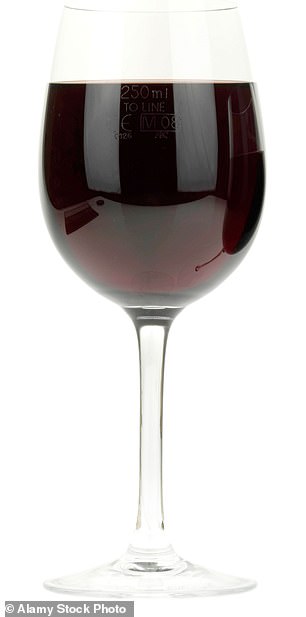
Glass of red wine, 250ml
Glass of red wine, 250ml
Excess calories: 211
Potential yearly weight gain: 1st 8lb
Expert comment: A glass of red wine a day can provide us with some antioxidants [which protect cells from damage linked to cancer, for example], but what feels like a small measure served at home in a goblet glass can be more like a large one in a pub.
Buy a small wine glass and try to have a three-day gap between drinking days, which will help your liver and waistline.
One apple
Excess calories: 95
Potential yearly weight gain: 9.9lb
Expert comment: This proves that any food, if eaten in excess, can contribute to weight gain.
But I wouldn’t suggest that you have to cut this out of your daily intake to address calorie creep, as apples provide gut-friendly fibre and nutrients that support immunity, such as vitamin C.
However, some people find that eating fruit alone between meals can make them hungrier — adding a little protein, such as a square of feta cheese, can help.
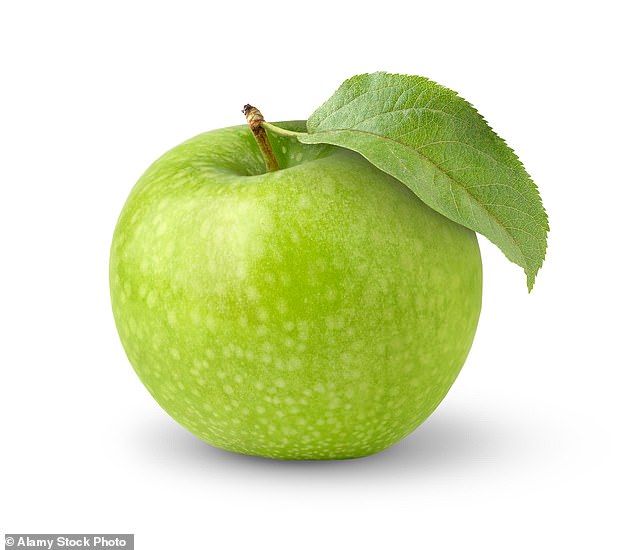
Any food, if eaten in excess, can contribute to weight gain. I wouldn’t suggest that you have to cut this out of your daily intake to address calorie creep, as apples provide gut-friendly fibre and nutrients that support immunity, such as vitamin C
Six Brazil Nuts
Excess calories: 186
Potential yearly weight gain: 1st 5lb
Expert comment: Nuts contain healthy fats, fibre and nutrients such as zinc and selenium which are harder to get elsewhere in your diet.
Research shows that people who eat nuts every day have a lower risk of heart disease and some cancers, so you shouldn’t eliminate them entirely.
Instead, stick to a small handful — around six nuts.
Try mixing them with something else crunchy, such as celery, to keep you feeling satisfied.
Chocolate Hobnob
Excess calories: 93
Potential yearly weight gain: 9.7lb
Expert comment: This is an example of a food that contains empty calories — i.e. ones that have little to no nutritional value — and these should be your first port of call when addressing calorie creep.
Swapping to a lower-calorie choice such as an Oreo (53 calories) will roughly halve the potential yearly weight gain.
But if the issue is that once a packet is open, you can’t stop at one, buy individually wrapped biscuits such as Breakaways (99 calories) and make them a weekly treat.
We tend to crave sweet foods if we’re tired or stressed, so try to be aware of this, too.
Pasta, 75g
Excess calories: 279
Potential yearly weight gain: 2st 1lb
Expert comment: A recommended serving is around 75g dry pasta (about 180g cooked), but many people eat much more than that.
The British Nutrition Foundation’s analysis of a survey in 2019 found that 10 per cent of people were eating as much as 350g cooked pasta.
Since it’s low in fibre, it’s easy to overeat it, so ensure you weigh your portion.
You can also swap to lentil pasta, which is higher in fibre so is more filling, meaning you need less of it to feel satisfied. Alternatively, you can bulk out a dish using 50g to 75g dried pasta with plenty of vegetables.
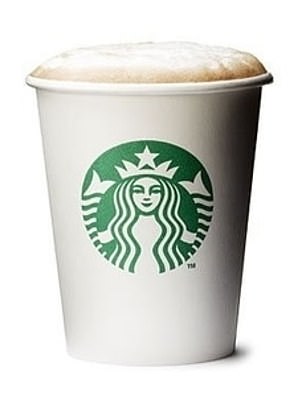
Starbucks Cappuccino with Whole Milk, Short
Starbucks Cappuccino with Whole Milk, Short
Excess calories: 85
Potential yearly weight gain: 8.8lb
Expert comment: Calories from coffees can really add up. The amount of sugar or syrup they contain, and the type of milk used, really make a difference.
A cappuccino isn’t a bad choice as you get calcium from the milk and it has relatively little sugar, but switching to a white Americano could help you make savings.
Half a 90g Green & Black’s Organic Dark 70% Bar
Excess calories: 261
Potential yearly weight gain: 1st 13lb
Expert comment: Dark chocolate is lower in fat than milk chocolate, and has lots of antioxidants that are good for us to have occasionally.
But it is easy to overeat it when you buy a large bar, so get the 15g mini bars (83 calories) instead.
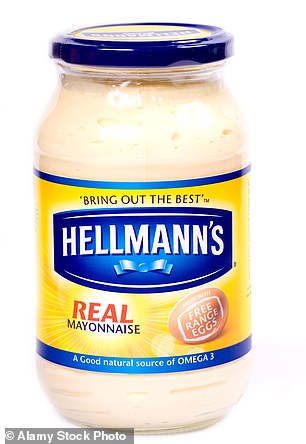
Hellman’s Real Mayonnaise
Hellman’s Real Mayonnaise, 1tbsp
Excess calories: 101
Potential yearly weight gain: 10.5lb
Expert comment: Mayonnaise doesn’t offer any real health benefits, so it’s something you should ideally avoid.
If you don’t want to leave the dressing off your salad or sandwich entirely, at least make the switch to low-fat mayo or other lower-calorie salad dressings. For example, you would save around 90 calories a day if you swapped to Hellmann’s Lighter Than Light mayo.
Handful of dried apricots
Excess calories: 64
Potential yearly weight gain: 6.7lb
Expert comment: Dried fruit tends to be full of antioxidants, and is high in fibre that feeds the good bacteria in the gut.
But it can also be high in sugar, so balance this out by replacing some of the fruit with a source of protein, such as roasted chickpeas, to make the snack more filling and reduce your portion size.
Aim for no more than 30g of dried fruit a day. That’s about four dried apricots — a small handful.
McCoy’s Cheddar & Onion Grab Bag, 47.5g
Excess calories: 249
Potential yearly weight gain: 1st 12lb
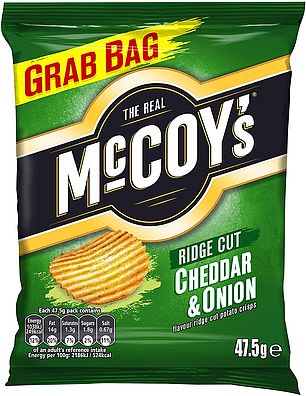
McCoy’s Cheddar & Onion Grab Bag
Expert comment: Crisps generally do more harm than good, because they are usually high in saturated fat and salt.
They can also be a source of acrylamide in our diet, a by-product of cooking that’s linked with cancer.
If you don’t want to give them up entirely, swapping to lower-calorie types such as Wotsits or Quavers (which have less than 90 calories per packet) can reduce some of the impact.
Or try lentil crisps, which are higher in fibre so you may feel more satisfied when eating a smaller portion.
Peanut butter, 1tbsp
Excess calories: 93
Potential yearly weight gain: 9.7lb
Expert comment: Low-sugar peanut butter contains healthy omega-3 fats [needed for brain and heart health] — but people can find it hard to limit the amount they consume. A portion should be around 1tbsp.
If you find that once you start you can’t stop, then you can buy individual sachets of peanut butter online.
Alternatively, try powdered peanut butter which you add water to, as it has fewer calories.
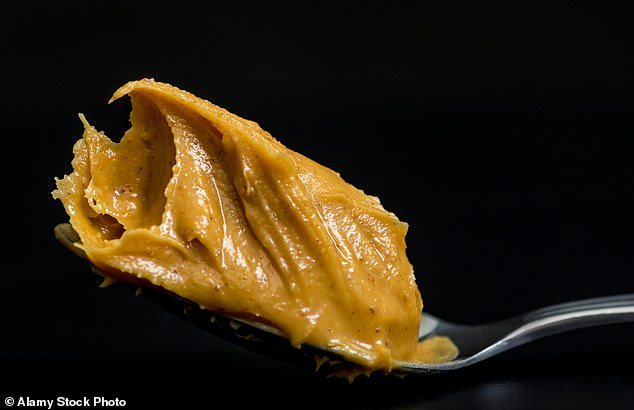
Peanut butter
Olive oil, 1tbsp
Excess calories: 120
Potential yearly weight gain: 12.5lb
Expert comment: Olive oil has powerful anti-inflammatory properties and helps reduce levels of the bad form of cholesterol in our blood, but these benefits are quickly undone if we have too much of it.
Make sure you measure out your serving rather than simply pouring it on — and you should use a dessertspoonful rather than a tablespoon.
Alpen Light Salted Caramel Cereal Bar
Excess calories: 66
Potential yearly weight gain: 6.9lb
Expert comment: Not all cereal bars are created equal — and some can leave you hungrier after eating them.
This is because they contain a lot of sugar, which can lead to fluctuations in blood sugar which make you feel hungry.
Instead, opt for bars that contain more nuts than cereals, as these are higher in protein and lower in sugar, which will keep you fuller for longer.
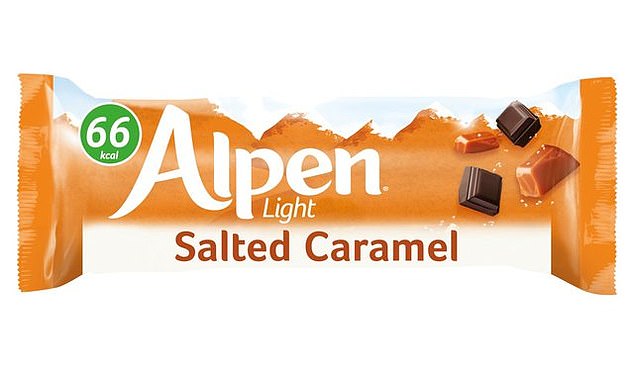
Alpen Light Salted Caramel Cereal Bar
Slice of cheddar, 28g, with a cream cracker
Excess calories: 148
Potential yearly weight gain: 1st 1lb
Expert comment: About a third of cheese is fat, so be conscious of that extra energy.
Buy cheese that has more flavour, as we tend to need less of this to satisfy us.
Try experimenting with stronger cheese such as mature Cheddar or blue cheese.
Opt for a wholegrain cracker such as an oatcake or a Ryvita, as it contains more fibre than a cream cracker.
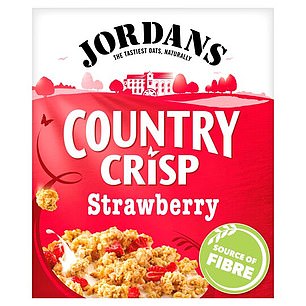
Spoonful of Jordan’s Country Crisp Strawberry cereal
Spoonful of Jordan’s Country Crisp Strawberry cereal, 15g
Excess calories: 65
Potential yearly weight gain: 6.8lb
Expert comment: Some cereals can be very calorific and, if they are the focus of your meal, you need to eat quite a lot to feel like you’ve had a good-sized serving — so, change how you use them.
Make breakfast something high in protein such as Greek yoghurt and berries, and just sprinkle a small spoonful of cereal on top.
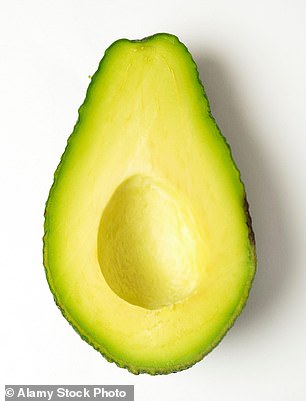
Half an avocado
Half an avocado
Excess calories: 161
Potential yearly weight gain: 1st 3lb
Expert comment: This is a good source of healthy mono-unsaturated fats that are linked to better heart health. These fats can also help us feel full, so you don’t want to eliminate avocado from your meals entirely. But do reduce the portion size to a quarter if you eat it daily.
Innocent Strawberries and Bananas Smoothie, 250ml
Excess calories: 129
Potential yearly weight gain: 13lb
Expert comment: Smoothies can be a helpful way to top up fruit and vegetable intake if you struggle to eat enough, but keep the portion size small — around 150ml — and ensure that there’s no added sugar.
A good test is to check the amount you serve doesn’t contain more fruit than you would normally eat in one sitting.
For example, this bottle provides seven strawberries, six black-currants, three-quarters of a banana, ten grapes, half an apple, and a squeeze of orange juice, which is two to three servings of fruit.
But it will provide some vitamin C and antioxidants.
Fried egg
Excess calories: 100
Potential yearly weight gain: 10.4lb
Expert comment: Eggs are a great source of protein and other important nutrients including vitamins A, B12 and E, but when you fry something you add calories from the oil used.
Eating a poached or boiled egg will save around 25 calories and reduce the saturated fat content.
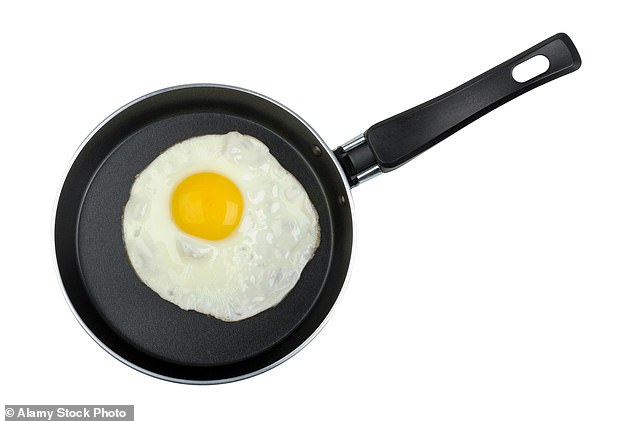
Fried egg
Medium slice of white bread
Excess calories: 93
Potential yearly weight gain: 9.7lb
Expert comment: There’s nothing wrong with including bread in your diet, but it may add extra calories that you don’t need.
Swapping this for a denser bread such as German rye bread will take longer to eat, offers more fibre, and has a more satisfying flavour, which may mean you eat less.
Muller Corner Red Cherry Yoghurt
Excess calories: 157
Potential yearly weight gain: 1st 2lb
Expert comment: Yoghurts with a fruit compote are delicious but the compote is usually mostly sugar with very little of the benefits of whole fruit.
Make your own by blending fresh or frozen berries with a little honey to add vitamins and fibre.
Another trick is to mix a children’s fruit pouch containing no added sugar with a pot of unsweetened natural yoghurt.
Hummus, 50g, with two breadsticks
Excess calories: 165
Potential yearly weight gain: 1st 3lb
Expert comment: This is easy to nibble your way through — so it’s a good idea to halve the hummus portion and swap the breadsticks for carrot sticks. These take longer to eat and so will fill you up faster.
Carrots also contain more nutrients, such as vitamin A (for eye health), beta-carotene (for healthy skin) and calcium and vitamin K (for strong bones).
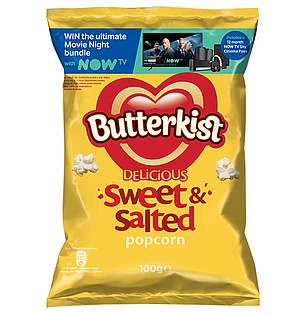
Butterkist sweet & salted popcorn
Butterkist sweet & salted popcorn, 30g
Excess calories: 156
Potential yearly weight gain: 1st 2lb
Expert comment: Plain popcorn can be a great low-calorie snack — but many packet versions contain lots of sugar.
Pick unsweetened or savoury options instead.
Source link : https://www.dailymail.co.uk/health/article-9899161/Calorie-creep-make-two-stone-year.html











